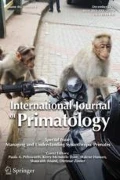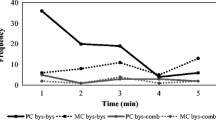Abstract
Previous studies on macaques and baboons showed that after agonistic conflicts aggressees as well as aggressors show an increase in stress-related behavior such as scratching. Reconciliation reduces stress-related behavior of the aggressee. We investigated the influence of various affiliative postconflict behaviors of the aggressor on the aggressor's scratching rates in captive long-tailed macaques: reconciliation, contacts with the aggressee's kin (or substitute reconciliation), and contact with other group members (or triadic affiliation). After a conflict, the aggressor showed an increase in rates of scratching. Scratching rates were reduced after reconciled conflicts compared to nonreconciled conflicts. Substitute reconciliation did not reduce scratching when we controlled for the influence of reconciliation, i.e., the aggressor might not interpret it as a substitute for reconciliation. Triadic affiliation did not reduce scratching rates, hence, triadic affiliation probably does not console the aggressor. Scratching rates after reconciliation are significantly lower than scratching rates after triadic affiliation. This proves that the stress-reducing effect of reconciliation is not due to the calming effect of general body contact but that the stress reduction is specifically associated with contacts with the former opponent. The contestants are anxious about their relationship, and only reconciliation takes away this anxiety. Reconciliation is thus an important social repair strategy.
Similar content being viewed by others
REFERENCES
Altmann, J. (1974). Observational study of behavior: Sampling methods. Behaviour 49: 227-266.
Angst, W. (1974). Das Ausdrucksverhalten des Javaneraffen Macaca fascicularis Raffles 1821. Fortschritte der Verhaltensforschung, Beiheft 15 zur Z. Tierpsychol.
Aureli, F. (1997). Conflict and anxiety in nonhuman primates: An emotional perspective to conflict resolution. Aggress. Behav. (in press).
Aureli, F., and van Schaik, C. P. (1991a). Post-conflict behaviour in long-tailed macaques (Macaca fascicularis). I. The social events. Ethology 89: 89-100.
Aureli, F., and van Schaik, C. P. (1991b). Post-conflict behaviour in long-tailed macaques (Macaca fascicularis). II. Coping with the uncertainty. Ethology 89: 101-114.
Aureli, F., van Schaik, C. P., and van Hooff, J. A. R. A. M. (1989). Functional aspects of reconciliation among captive long-tailed macaques (Macaca fascicularis). Am. J. Primatol. 19: 39-51.
Aureli, F., Das, M., and Veenema, H. C. (1997). Differential kinship effect on reconciliation in three species of macaques (Macaca fascicularis, M. fuscata, and M. sylvanus). J. Comp. Psychol. 111(1): 91-99.
Castles, D. L., and Whiten, A. (1996). Baboon relationships: Scratching and feelings. Abstract from the XVIth Congress of the International Primatological Society, Madison, WI.
Cheney, D. L., and Seyfarth, R. M. (1989). Redirected aggression and reconciliation among vervet monkeys, Cercopithecus aethiops. Behaviour 110: 258-275.
Cords, M. (1992). Post-conflict reunions and reconciliation in long-tailed macaques. Anim. Behav. 44: 57-61.
Das, M. Penke, Zs., and van Hooff, J. A. R. A. M. (1997). Affiliation between aggressors and third parties following conflicts in long-tailed macaques (Macaca fascicularis). Int. J. Primatol. 18: 157-179.
de Waal, F. B. M. (1988). Reconciliation among primates. In Mason, W., and Mendoza, S. (eds.), Primate Social Conflict, Alan Liss, New York, pp. 111-144.
de Waal, F. B. M., and Luttrell, L. M. (1989). Towards a comparative socioecology of the genus Macaca: Different dominance styles in rhesus and stumptail macaques. Am. J. Primatol. 19: 83-109.
de Waal, F. B. M., and van Hooff, J. A. R. A. M. (1981). Side-directed communication and agonistic interactions in chimpanzees. Behaviour 77: 164-198.
de Waal, F. B. M., and van Roosmalen, A. (1979). Reconciliation and consolation among chimpanzees. Behav. Ecol. Sociobiol. 5: 55-66.
de Waal, F. B. M., and Yoshihara, D. (1983). Reconciliation and redirected affection in rhesus monkeys. Behaviour 85: 223-241.
de Waal, F. B. M., van Hooff, J. A. R. A. M., and Netto, W. J. (1976). An ethological analysis of types of agonistic interactions in a captive group of Java-monkeys (Macaca fascicularis). Primates 17(3): 257-290.
Diezinger, F., and Anderson, J. R. (1986). Starting from scratch: A first look at a “displacement activity” in group-living rhesus monkeys. Am. J. Primatol. 11: 117-124.
Judge, P. G. (1991). Dyadic and triadic reconciliation in pigtail macaques (Macaca nemestrina). Am. J. Primatol. 23: 225-237.
Kaplan, J. R. (1986). Psychological stress and behavior in nonhuman primates. In Mitchell, G., and Erwin, J. (eds), Comparative Primate Biology, Vol. 2A. Behavior, Conservation, and Ecology, Alan Liss, New York, pp. 455-492.
Kappeler, P. M., and van Schaik, C. P. (1992). Methodological and evolutionary aspects of reconciliation among primates. Ethology 92: 51-69.
Maestripieri, D., Schino, G., Aureli, F., and Troisi, A. (1992). A modest proposal: Displacement activities as an indicator of emotions in primates. Anim. Behav. 44: 967-979.
Pavani, S., Maestripieri, D., Schino, G., Turillazzi, P. G., and Scucchi, S. (1991). Factors influencing scratching behaviour in long-tailed macaques (Macaca fascicularis). Folia Primatol. 57: 34-38.
Petit, O., and Thierry, B. (1994). Reconciliation in a group of Guinea baboons. In Roeder, J. J., Thierry, B., Anderson, J. R., and Herrenschmidt, N. (eds.), Current Primatology, Vol. II. Strasbourg, Université Louis Pasteur, pp. 137-145.
Schino, G., Scucchi S., Maestripieri, D., and Turillazzi, P. G. (1988). Allogrooming as a tension-reduction mechanism: A behavioral approach. Am. J. Primatol. 16: 43-50.
Siegel, S., and Castellan, N. J. (1988). Nonparametric Statistics for the Behavioral Sciences, McGraw-Hill, Singapore.
Silk, J. B. (1987). Social behavior in evolutionary perspective. In Smuts, B. B., Cheney, D. L., Seyfarth, R. M., Wrangham, R. W., and Struhsaker, T.T. (eds.), Primate Societies, University of Chicago Press, Chicago, pp. 318-329.
Thierry, B. (1986). A comparative study of aggression and response to aggression in three species of macaque. In Else, J. G., and Lee, P. C. (eds.), Primate Ontogeny, Cognition and Social Behavior, Cambridge University Press, Cambridge, pp. 307-313.
van Hooff, J. A. R. A. M. (1967). The facial displays of the catarrhine monkeys and apes. In Morris, D. (ed.), Primate Ethology, Weidenfeld & Nicholson, London, pp. 7-68.
Vehrencamp, S. (1983). A model for the evolution of despotic versus egalitarian societies. Anim. Behav. 31: 667-682.
Verbeek, P., and de Waal, F. B. M. (1996). Agonism and its aftermath in a captive group of Cebus apella. Abstract from the XVIth Congress of the International Primatological Society, Madison, WI.
Watts, D. P. (1995). Post-conflict social events in wild mountain gorillas. II. Redirection, side direction, and consolation. Ethology 100: 158-174.
York, A. D., and Rowell, T. E. (1988). Reconciliation following aggression in patas monkeys, Erythrocebus patas. Anim. Behav. 36: 502-509.
Author information
Authors and Affiliations
Corresponding author
Rights and permissions
About this article
Cite this article
Das, M., Penke, Z. & van Hooff, J.A.R.A.M. Postconflict Affiliation and Stress-Related Behavior of Long-Tailed Macaque Aggressors. International Journal of Primatology 19, 53–71 (1998). https://doi.org/10.1023/A:1020354826422
Issue Date:
DOI: https://doi.org/10.1023/A:1020354826422




